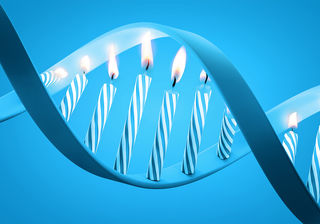Is There a Biomarker That Predicts Your Biological Age?
After years of study, a test that measures aging is on the horizon.
Posted Oct 04, 2019

If you’re like most people, for as long as you can remember you’ve been answering the question, “How old are you?” When you were a kid, you probably looked forward to adding another candle to the count on your birthday cake. As you entered adulthood—well, that began to wear off quickly. Growing older, for better and for worse, is a central part of the human experience.
But your chronological age is just one piece of the puzzle. Scientists have long been fascinated by the fact that some people seem to age— in terms of health and appearance—faster than most while others age more slowly. We now know this is largely determined by genetics and lifestyle factors. For decades, biogerontologists have been on the hunt for a biomarker of aging—a single test that measures the biological process of aging and could even accurately predict your “biological age.” Unlike your chronological age, your biological age doesn’t just measure your time here on earth, but rather how your body functions relative to others of the same chronological age as you. So, for example, perhaps you’re 65 according to your passport. But depending on your health and genetics, your biological age might be closer to that of someone who is 55 or 75.
So far, this biomarker of aging has been rather elusive. Scientists have long used imperfect existing measures like lung capacity or grip strength or even body mass index (BMI) as measures of aging, but because we know that the process of aging actually begins at the cellular level, long before these more obvious physical signs arrive, the holy grail would be a marker that actually senses the breakdown on a molecular level in cells.
It turns out that one of the most interesting new biomarkers of aging is the genetic material, DNA. In the 1990s, it was found that the length of telomeres, which are repeated sequences at the ends of chromosomes, shorten with age. Telomeres are maintained by an enzyme called telomerase that adds repeats of the sequence TTAGGG to the ends of chromosomes to maintain proper telomere length. Several studies have shown that telomere length is predictive of future health outcomes. For one cross-sectional study, researchers measured telomere length in 143 people over age 60, and then followed subjects over more than a decade, and found that those people with longer telomeres had lower mortality rates than those with shorter telomeres. Subsequent studies have shown that telomere shortening can be accelerated by stressful life experiences.
Around the same time, John-Pierre Issa, a researcher and expert in genetic changes related to cancer, found that an increase in another type of DNA modification—specifically, DNA methylation at CpG sequences—changed with aging. DNA methylation refers to a enzymatic addition of a methyl group to the DNA that can cause changes in gene expression (which is different from changing the genetic code itself) and is an important element of what is termed epigenetics in cells.
This simple observation led to what is the most sensitive aging clock to date. In 2013, UCLA geneticist and biostatician Steve Horvath followed on recent data linking levels of DNA methylation and chronological age. This study was unique in using machine learning tools and computational analysis of data from many different tissues and stem cells from roughly 100,000 different people of different ages. Horvath was able to identify 350 CpG methylation sites, the level of methylation of which could closely predict chronological age in many different tissue types. It was indeed surprising to see the degree of accuracy and generality embodied by this simple measurement now called the epigenetic clock.
While the epigenetic clock correlates very well with chronological age, the correlation is never perfect; i. e. samples are often identified as older or younger than the chronological age. The question is whether people identified as older or younger than their chronological age are actually biologically younger or older. A subsequent study found that indeed, the epigenetic clock was predictive of life expectancy. That is, younger or older clock measurements were predictive of lower or higher all-cause mortality in a population of 13,000 people.
The precision of the epigenetic clock greatly exceeds that of measuring telomere length. Thus, this methodology is now the best and most accurate biomarker of aging. The adoption of such a measure could revolutionize not only our healthcare system and how we think of disease, but how we experience aging itself. Most importantly, the adoption of biomarkers like this one seems to be on the near horizon. In next month’s column, we’ll dive into new biomarkers under development, and explore the many implications and uses of biomarkers that predict your biological age.